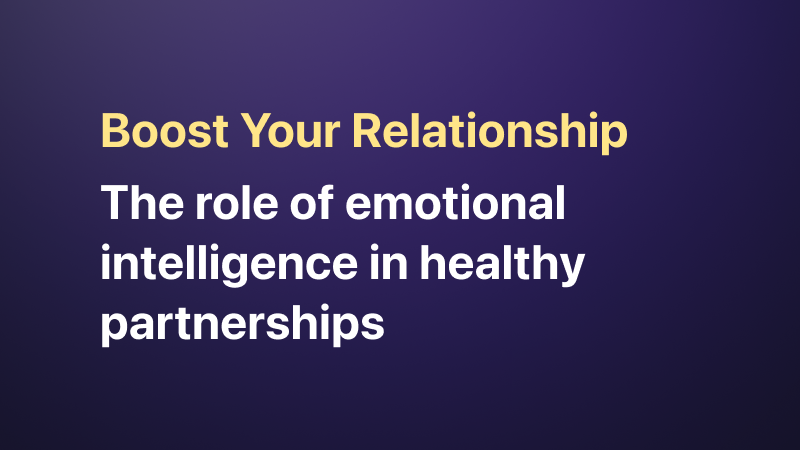If relationships had a secret sauce, emotional intelligence would be the zesty, magical ingredient that turns a bland connection into something truly delicious. You don't need a PhD in psychology to make your relationship thrive. You just need a little curiosity, some self-awareness, and the willingness to listen, even when your partner tells you that you didn't load the dishwasher "the right way." (Spoiler alert: there is no right way.)
Let’s dive into how understanding your emotions and those of your partner can make your relationship not just work but really shine.
1. Get Curious About Your Own Emotions
Imagine your emotions are like a playlist on shuffle—you never know what track is coming up next. Instead of skipping songs you don’t like, try listening and understanding why they’re there. When you're aware of what’s playing in your head, you can better handle those tracks instead of letting them turn into an unexpected mosh pit at the dinner table.
Being curious about your emotions isn’t about solving them; it’s about noticing them. Next time you feel irritated, ask yourself, "What’s this really about? Did I have a rough day, or did I just want the last piece of pizza?" A little introspection goes a long way in dialing down drama.
2. Tune Into Your Partner’s Feelings
No one’s asking you to read minds here. But paying attention to your partner’s cues—the tone of their voice, their body language, or that subtle eye roll they do when you tell your third pun of the day—can give you insights into how they’re feeling.
It’s not about fixing their emotions but simply noticing them. A simple “Hey, you seem off—what’s up?” goes miles further than “You’re in a mood again.” You’re not Sherlock Holmes, but you are curious and open, and that’s more than enough to show your partner you care.
3. Speak the Language of Feelings Without the Mush
Look, talking about feelings can feel about as fun as untangling Christmas lights in July. But it doesn’t have to be this deep, heavy experience every time. Just naming what you’re feeling—frustrated, joyful, meh—can be enough.
The goal isn’t to have a heart-to-heart every night; it’s to create a habit of sharing your internal playlist with your partner, even if it’s just one song at a time. Little snippets like “I’m feeling a bit anxious today” or “I’m really excited about this thing at work” make emotional connection feel more like a casual catch-up than a therapy session.
4. Manage Your Moods, Not Each Other
Let’s be honest—nobody loves a meltdown, especially when it’s over something like mismatched socks. Learning to recognize and manage your moods before they spill onto your partner is a game-changer. It’s about taking a breath, grabbing a snack, or going for a walk when you feel your emotions cranking up to 11.
You’re not perfect, and neither is your partner, but when you both take responsibility for your own emotional states, you create a much more chill, loving atmosphere. And honestly, who doesn’t want that?
5. Keep the Emotional Bank Account in the Green
Think of your relationship like a bank account. Every time you listen, share, or just show up with kindness, you’re making a deposit. Every time you snap, ignore, or roll your eyes, you’re making a withdrawal. Keep your balance in check by staying aware of your actions and reactions.
The more you invest in the little moments, the richer your relationship becomes. So, go ahead, make those deposits, even if it’s just with a smile or a kind word. It all adds up.
Self-Reflection Question: What’s one small way I can be more in tune with my emotions or my partner’s feelings this week?
Quiz: Are You Emotionally In Tune?
-
When your partner seems upset, what’s your first instinct?
A) Ignore it and hope it goes away
B) Ask them what’s wrong in a non-judgmental way
C) Immediately try to fix whatever’s wrong -
How often do you share your feelings with your partner?
A) Rarely, emotions are messy
B) Sometimes, when it feels important
C) Often, even if it’s just little updates -
When you’re feeling off, how do you usually handle it?
A) Bottle it up until it spills
B) Take a moment to figure out what’s going on
C) Immediately tell my partner so they can help
Remember, building emotional intelligence is like learning to dance—it’s awkward at first, but the more you do it, the more natural it feels. Keep it fun, keep it curious, and keep showing up for each other. Your relationship is worth it!




